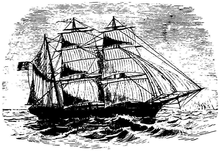Article by Sheri White
A “packet” in maritime terms is a ship or boat regularly used to carry mail or passengers from England to any of its various outposts. One of the early packets which eventually found use as a missionary ship was the 80-ton sloop, Jersey Packet.

The Moravian Church, founded in the 15th century in Bohemia, is a Christian sect which believes strongly in what we in YWAM today call “outreach”. From their founding, they considered all men worthy of being introduced to the Savior. With this focus in mind, the Brethren of the Moravian Church, who had already established a base in Greenland, set out in the mid-18th century to reach the Innuit people of Labrador in Newfoundland.
The earliest contact between Europeans and the Innuit ended in tragedy when several missionaries and traders were killed on an outreach expedition. The Brethren then turned to a man named Jens Haven to reach the natives on Labrador. Haven had spent years in Greenland learning the native language, which was the same used by the population in Newfoundland. As well as the language, he also studied their culture and knew that in order to reach those on Labrador, the Brethren would need to treat the natives with respect and friendship before trying to trade with them, or, more importantly, reach them with the Gospel message.
Because of the decision of the Brethren to treat the natives as Christ would have done, Haven and his men were successful in being the first Europeans to be accepted on Labrador island. The missionary base in Nain, where the newly converted natives encouraged he and his men to build in 1770, remains to this day.
As this is part of our ongoing dive into the history of maritime missions, stay tuned each month for more sea-faring missionary tales such as this one about the Jersey Packet.

